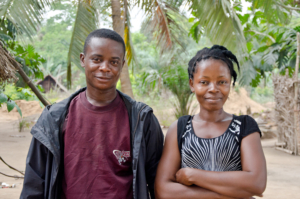In January 2023, Liberia’s Ministry of Health recognized Rivercess, Grand Gedeh, and Grand Bassa as the country’s best-performing counties under the National Community Health Program for 2022. Last Mile Health has been honored to implement the program alongside the county health team in these three counties. Assistant Minister of Vital and Health Statistics C. Sanford Wesseh presented the awards at the Ministry’s national bi-annual review meeting in Ganta City, Nimba County, recognizing Rivercess, Grand Gedeh, and Grand Bassa counties as first, second, and third respectively.
“The Ministry of Health and partners in implementing the national program looked at the key performance indicators for the program, such as the treatments and referrals community health workers provided as well as the support they received,” explains Last Mile Health’s Liberia Country Director Marion Subah. “In our managed counties, the highest percentages of community health workers had no stock-outs of supplies, and they were paid on time. They also achieved a high standard in the percentage of correct treatment for children with diseases like malaria, diarrhea, and pneumonia, and in referrals to health facilities.”
Marion notes that Rivercess County has not only achieved a high standard in providing the primary care services the national program requires, but also carried out a number of pilot programs. One such pilot, which trained community health workers to administer the injectable contraceptive Sayana Press to women seeking family planning services, will be adopted nationwide as part of Liberia’s new community health policy. “We’re doing new things to see how well they work at the community level,” says Marion. “We’re happy that the pilot’s success is paying off.”
Looking ahead, Marion emphasizes that there are still challenges in the implementation of the national program—and the support community health workers received. “At the Community Health Workers Symposium in Monrovia, we heard all about the progress that has been happening for community health workers around the world, but we need to recognize that that brings us to new challenges, and how we can meet them,” she says. “How can we give community health workers a career path? How can we make the program sustainable, so that the community can become better? How can we close the gender gap? Those new challenges are things we have to work on.”
In our managed counties and beyond, this is the moment to address those challenges by building on political will and recent key milestones for Liberia’s community health workforce—among them the new community health policy, the Liberian government’s new commitment of $1.8 million to add community health services supervisors to the payroll, and the launch of the Monrovia Call to Action at the Symposium. “Because of what happened last month in Monrovia, this call to action—the power of community health workers can’t be ignored any more,” says Marion. “We can’t achieve universal health coverage without prioritizing the last mile first by advancing community health worker programs that will accelerate primary health care. Everywhere we go, we want to keep the emphasis on community health. We need to keep at it. We won’t let the opportunity pass.”







